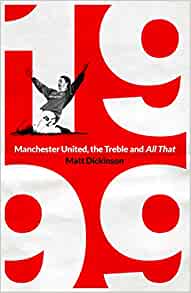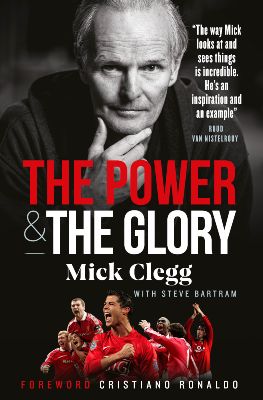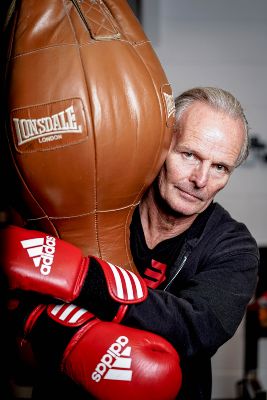1999 Manchester United, the Treble and All That
In 1999, Manchester United made football history when they became the first English or Welsh club to win the Premier League, FA Cup and UEFA Champions League treble. In his brilliant book, 1999 Manchester United, the Treble and All That, Matt Dickinson pulls no punches. He unravels the interactions and influence of personalities within the dressing room and beyond. Matt is as an outstanding sports writer, which is evident in the 99 short chapters that make up the book.
Many local readers will be aware of the number of outstanding players from the Wrexham area and North Wales who have played for United. They include Billy Meredith (Chirk), Ray Bennion, Tommy Bamford (both Wrexham), Tom Jones (Penycae), Wyn Davies (Caernarfon), Mickey Thomas (Mochdre) and Mark Hughes (Rhiwabon).

11 Points Clear
The author examines the historical background to United’s success from three perspectives: political, social and supporter. He highlights key events from 1998 as crucial moments in generating the thrust for change. United were 11 points clear at the top of the league, but, much to the anguish of supporters, they were overtaken by Arsenal. Arsenal snatched the Premiership by one point and then completed the double by beating Newcastle United in the Cup Final.
Alex Ferguson’s position as the manager came under pressure from supporters and the board. The gripping background to the subsequent call for managerial upheaval will enthuse readers. The author highlights how the “fracas” culminated in Ferguson, driven by a “tankful of anger”, withdrawing his initial resignation and carrying on in charge.
Jaap Stam and Dwight Yorke arrived to support Beckham, Butt, Giggs, Scholes, and the Neville brothers. Who are known as the “class of 92”.
Readers will gain insight into the influence and importance of Roy Keane as their “demanding and forceful” captain. Despite his confrontations with Alfie Haaland, Patrick Vieira and team mate Teddy Sheringham, his tenacity and midfield driving force were vital.
Hairdryer Treatment
Alex Ferguson is clearly a formidable yet parental figure for the players with his traditional football principles of discipline and resilience. The “hairdryer treatment” was feared, but players also craved his approval and respect.
His achievements as an outstanding manager were recognised by his knighthood and the freedom of Glasgow and Manchester. As the author notes, the former shop steward for the shipyard apprentices in Glasgow had “come a long way”.
By the late 1990s, Manchester United was more than just a football team. They were a commercial brand with a global fan base and a market that generated real financial muscle. They have not won the Premier League since Ferguson left in 2013. Supporters look enviously at the success of neighbouring City and fierce rivals Liverpool.
The board have failed to replace the manager and players so far. Only time will tell if Eric ten Hag will emulate the outstanding achievements of 1999 and bring silverware back to Old Trafford.
This book is a fascinating insight into the mindsets of a manager and players at the highest level. Readers will be engrossed by the intrigue and drama of one year in English football that deserves to be retold. Well worth reading.
The Power And The Glory
In sport, education and work situations, the skill of the coach, teacher or team leader is crucial in determining to what level an individual fulfills their potential.
In The Power And The Glory, Mick Clegg reflects on his career as a development coach at Manchester United. Mick lifts the lid on his journey into coaching, highlighting that “understanding the inner psychology of the person” and “working within a framework of what is possible” is critical for aspiring coaches.
A coach needs to be enthusiastic, positive, knowledgeable, and able to improve performance levels. He considers it key to “shut up, observe, listen and understand”.
Mick stresses that it’s not you telling them what to do but making them realise what they should do by immersing them in the process. Remember the adage, “You only learn to swim by getting in the water and moving.”

Burnout
Mick traces his journey coaching football, netball, athletics, and weight training, initially working with his own children, community groups and schools. Unfortunately, his success as a motivational coach resulted in him experiencing “burnout” by taking on too many challenges on top of his full-time job.
Mick went back to basics, successfully coaching his own children in the community. This resurgence led to his appointment at Manchester United and introduced a new dimension to training the academy players.
This new regime was based on weight lifting and strength training allied to explosive physical activities like boxing and plyometrics. Clegg highlights how the coach has to use his skill to promote drive, desire and determination by gaining insight into the areas players needed to improve. Clegg would then add the necessary training to develop that specific skill set.
Developing a mindset to take “ownership” of where to improve is fundamental for a player to be successful rather than just promising. Interestingly, a growing number of managers and coaches within the professional game are supplementing their coaching badges by following additional courses in counselling and mentoring.
Readers will learn about how Mick gained the respect of key personnel such as Sir Alex Ferguson, Wayne Rooney, Cristiano Ronaldo, Paul Scholes and others by involving them in training programmes like sparring.

Roy Keane accepting and buying into Mick’s training methods was especially important in giving them credibility within the club.
This excellent book gives a clear insight into the strategies and skills necessary to be a successful coach. Clegg stresses that coaches must be aware of a wide range of physical and mental conditioning techniques.
The author highlights how the effective coach builds trust by listening and understanding the player’s point of view.
For more book reviews, click here.


